Center Of Social Innovations
- University of Lodz
- Social Committment
- Center Of Social Innovations
News
About the center
The Center for Social Innovation at the University of Lodz is:
- an interfaculty, interdisciplinary unit of the University of Lodz operating since 2017
- an organization formed by representatives of four faculties of the University of Lodz: the Faculty of Philosophy and History, the Faculty of Educational Sciences, the Faculty of Management, and the Faculty of Economics and Sociology
- a unit that designs, implements, and supports social innovations defined as innovative, unconventional solutions addressing social challenges and problems
- an entity integrating the business sector, academia, and the social sector to support innovative solutions
Working teams
PROJECT TEAM
Tasks:
- securing grants
- conducting research projects on social innovations
Coordinators:
TEAM FOR RELATIONS WITH THE ECONOMIC ENVIRONMENT
Tasks:
- Collaboration with businesses
- Commercialization of science
Coordinator:
TEAM FOR RELATIONS WITH THE SOCIAL ENVIRONMENT
Tasks:
- collaboration with non-governmental organizations (NGOs) and informal groups
- designing, implementing, and evaluating social projects
- practical application of scientific knowledge by the third sector
Coordinators:
TEAM FOR EDUCATIONAL ACTIVITIES
Tasks:
- designing and implementing alternative forms of education and employment
- expanding the educational offerings of the University of Łódź in the following areas:
- integrating theory with practice
- conducting Action Research
- learning through engagement (Service Learning)
- Organizing conferences, seminars, workshops, etc.
Coordinators:
TEAM FOR PROMOTION AND MEDIA RELATIONS
Tasks:
- promotion of CEIN's activities
- media relations
Coordinators:
Scientific council and members of the center of social innovations
SCIENTIFIC COUNCIL
Katarzyna Zajda, PhD, DSc, Associate Professor – Head of the Center for Social Innovation
A sociologist, researcher, and practitioner in collaboration with local action groups, local government units, and non-governmental organizations (NGOs).
Graduate of the School of Leaders of Non-Governmental Organizations and the School of Building Local Partnerships.
Scholarship recipient of the Heinrich Böll Foundation and the Ministry of Science and Higher Education.
Project manager of "Local Systems of Social Innovations in Rural Areas" (NCN, UMO-2015/19/D/HS6/00690).
Currently leads the implementation project: "Using Knowledge About Social Innovations by Rural NGOs."
Contributor to the project "Enhancing the Potential of Management and Quality Sciences Through Better Utilization of Polish Rural Capital" (University of Agriculture in Kraków).
Key Publications on Social Innovations:
- Zajda, K., Mazurek, D. (2023). Public Institutions and NGOs Cooperation for Social Innovations in Post-Socialist Rural Poland, European Countryside, 14(4), pp. 623-637.
- Zajda, K. (2023). Social Innovations and Involving Rural Residents in the Process of Village Renewal. Wieś i Rolnictwo, 3, pp. 171–185.
- Pasikowski S., Zajda K. (2023). Nongovernmental organizations' leaders' attitude toward social innovation: The validation of a research tool, Nonprofit Management & Leadership, 22(4), pp. 835-850 https://doi.org/10.1002/nml.21543.
- Zajda K., Pasikowski S., Kretek-Kamińska A. (2023). The implementation of grassroots product-oriented social innovations by non-governmental organisations: proposal of a measurement tool, Innovation-The European Journal of Social Science Research, 36(2), pp. 301-315.
- Zajda K. (2023). What Features Distinguish the Rural Nongovernmental Organisations that Implement Social Innovations? Evidence from Postcommunist Poland, Voluntas. International Journal of Voluntary and Nonprofit Organizations, vol. 34, pp. 1221-1231, https://doi.org/10.1007/s11266-022-00546-8
- Zajda K. (2022). Implementing Social Innovations by Rural Non-Governmental Organizations and Local Action Groups, University of Lodz Press, Lodz.
- Zajda K. (2022). Collaboration Between Local Social Policy Entities and Social Innovation Systems in Rural Municipalities, Wieś i Rolnictwo, 1(194), pp. 41-55.
- Zajda K., Pasikowski S. (2020). Traits of Leaders of Rural Non-governmental Organisations as Predictors of Collaboration Between NGOs and Rural Gmina Offices: Voices from Central Poland, Voluntas. International Journal of Voluntary and Nonprofit Organizations, 31(2), pp. 345-358.
Contact details:
e-mail: katarzyna.zajda@uni.lodz.pl
Faculty of Economics and Sociology
Agnieszka Murawska, PhD – Chairperson of the Scientific Council
Sociologist at the Department of Rural, Urban, and Social Change Sociology at the Faculty of Economics and Sociology, University of Lodz.
Research focus: civil society, social participation, NGOs, the common good, and local communities.
Practitioner in collaboration with NGOs.
Participated in projects funded by EFS, INTERREG EUROPE, INTERREG EUROPA CENTRALNA, Europa dla obywateli.
Involved in international projects such as CARE-SMART „Innovation Ecosystem for Smart Elderly Care”, „Supporting the Clean Energy Transition of Coal-Intensive Regions (DECARB), „Challenges of Regional Centres: Depopulation Control, Development-best practices” (DeCoDe).
Author of the book: Civic Engagement of the Residents of Łódź and Ivanovo – Structure and Determinants, University of Lodz Press (2020) and scientific articles.
Contact details:
e-mail: agnieszka.murawska@uni.lodz.pl
Sociologist at the Department of Applied Sociology and Social Work, University of Lodz.
Focus areas: sociology of social problems, sociology of deviance and social control, criminology, penal policy, and social work.
Researches barriers to social reintegration of former prisoners and biosocial criminology.
Co-author of the book Social Work with Individuals Leaving Resocialization Facilities and Their Families, Centrum Rozwoju Zasobów Ludzkich Press (2014) and various scientific articles a.o.: Informal Support Circles in the Social Reintegration Process of Former Prisoners from a Biographical Perspective, Annales Universitatis Paedagogicae Cracoviensis. 307, Studia Sociologica 11 (2) (2019), pp. [139]-163; Contemporary Aspects of the Rehabilitation of Offenders in Selected European Countries. Acta Universitatis Lodziensis. Folia Sociologica, (62), (2017), pp. 63–81. https://doi.org/10.18778/0208-600X.62.05
Contact details:
e-mail: andrzej.kacprzak@uni.lodz.pl
Faculty of Philosophy and History
Inga Kuźma, PhD, DSc, Associate Professor
She works at the Laboratory of Ethnography and Folklore Studies in the Institute of Ethnology and Cultural Anthropology at the Faculty of Philosophy and History of the University of Lodz.
She engages in activist and interventionist anthropology, including action research and participatory action research. She collaborates with non-governmental organizations both in research and practice.
Her academic interests particularly include herstory and women's issues, social inclusion and exclusion, and, more recently, decolonization and environmental humanities.
From 2017 to 2024, she served as the head of the Center for Social Innovations at the University of Lodz (CEIN).
She is the head and co-creator of the project "Applied Humanities for Development: From Innovation to Application (APHUM Base and AP Forum)" under the DIALOG program by the Ministry of Science and Higher Education (2018-2019).
She co-founded the Interdisciplinary Gender Seminar.
She is a board member of the Łódzki Szlak Kobiet Foundation and was the coordinator of the Lodz Partnership for Assistance in Situations of Exclusion and Homelessness (2014-2018).
Since 2021, she has been a member of the Council for Solving the Problem of Homelessness at the Office of the Mayor of Lodz.
She is the author of works including "Homes of the Homeless. Research on Crisis Situations," published by the University of Lodz Press (2015).
She is also a co-editor of collective works published in the University of Lodz series "Faces of Feminism".
Contact details:
e-mail: inga.kuzma@uni.lodz.pl
Lecturer at the Institute of Ethnology and Cultural Anthropology at the University of Lodz.
Her areas of focus include: social inclusion, social innovations, visual anthropology, grassroots urban movements, alternative communities, and gender studies.
She has participated in research projects in the areas of social inclusion, marginalized groups, social participation, and cooperation with the third sector.
President of the Polish Ethnological Society, Lodz Branch.
Contact details:
e-mail: alicja.piotrowska@uni.lodz.pl
Faculty of Educational Sciences
Assistant Professor in the Department of Educational Research at the Faculty of Educational Sciences, University of Łódź.
A social pedagogue and special education teacher specializing in the education of individuals with intellectual disabilities.
Her areas of interest include: methodology of social research, lifelong learning processes, educational needs of children with special developmental difficulties.
Key Publications:
- Kos, E. A. (2023). Portraying studied autobiographical narratives: Scientific rigor or artistic expression? Reflections in the context of F. Schütze's narrative interview method.Biografistyka Pedagogiczna, Issue 1.
- Kos, E. A. (2020). Forms of therapy of a child with selective mutism in environments outside the family, embedded in a behavioral therapeutic approach. Interdyscyplinarne Konteksty Pedagogiki Specjalnej, Issue 31, pp. 287–304.
- Kos, E. A. (2020). Teachers' participation in professional educational communities in online environments and its impact on professional development.Edukacja Ustawiczna Dorosłych. Polish Journal of Continuing Education, Issue 3, pp. 149–159.
- Kos, E. (2018). Biographical experiences of women achieving professional success: Conditions of social participation. University of Lodz Press, Łódź.
- Kos, E. (2017). Reconstruction of selected factors shaping the educational paths of women who have achieved professional success in light of F. Schütze's theory.Edukacja Ustawiczna Dorosłych. Polish Journal of Continuing Education, Issue 4, pp. 28–37.
- Urbaniak-Zając, D., & Kos, E. (2013). Qualitative research in pedagogy: Narrative interview and objective hermeneutics. PWN Press, Warsaw
Contact details:
e-mail: ewa.kos@uni.lodz.pl
Assistant at the Department of Educational Research at the Faculty of Educational Sciences, University of Łódź.
Doctoral student at the Doctoral School of Social Sciences, University of Lodz.
Her areas of interest include: methodology of educational research, data analysis and data mining, innovations in education.
Contact details:
e-mail: martyna.jarota@now.uni.lodz.pl
Faculty of Management
Janusz Reichel, PhD, DSc, Associate Professor
Employed in the Department of City and Regional Management at the Faculty of Management, University of Lodz.
His research interests include: social and environmental aspects of management, corporate social responsibility (CSR), business ethics, environmental management, issues related to sustainable development.
An expert serving on numerous competition committees: European Commission (including the 7th Framework Programme and the COST initiative), National Science Centre (NCN), Ministry of Labor and Social Policy (Citizen Initiatives Fund), Foundation for the Development of the Education System (including Leonardo da Vinci), Polish Agency for Enterprise Development (PARP), European CSR Award Scheme for Partnerships, Innovation, and Impact.
Project leader of the award-winning Leonardo da Vinci ToI project (2012–2013): "Homoresponsabilis in the Globalized World" (2011-1-PL1-LEO05-19895), which received an award in the EduInspiracje 2016 competition.
Selected Publications:
- Reichel, J. Women Leaders of the Social Economy. Case Studies. 2024, Łódź, University of Lodz Press, 162 pages. ISBN: 978-83-8331-358-0. DOI:10.18778/8331-358-0.
- Reichel, J. Succession of Managerial Positions in Non-Governmental Organizations. 2018, Lodz, University of Lodz Press, 286 pages. ISBN: 978-8-3814-2178-2.
- Jonker, J., Rudnicka, A., Reichel, J. New Horizons: A Guide to Corporate Responsibility and Sustainable Development. Centrum Strategii i Rozwoju Impact and ODE Źródła, Łódź, 2011. ISBN: 978-83-932160-2-4.
- Reichel, J. Sector-Specific Corporate Responsibility in Poland, in T. Beschorner, T. Hajduk, S. Simeonov (Eds.), Corporate Responsibility in Europe: Government Involvement in Sector-Specific Initiatives. Gütersloh: Verlag Bertelsmann Stiftung, 2013, pp. 179–198.
- Reichel, J. Public Sector Involvement in the Promotion of Social Responsibility – Examples of Sector-Specific Instruments with a Special Focus on the Financial Sector in Poland, in A. Rudnicka-Reichel (Ed.), CSR Trends: Making a Difference. Centrum Strategii i Rozwoju Impact, Lodz, 2015, pp. 115–133.
Contact details:
e-mail: janusz.reichel@uni.lodz.pl
Employed in the Department of Logistics at the Faculty of Management, University of Lodz.
Research interests: sustainable business models, including social entrepreneurship and value chains, business ethics, diversity management, circular economy (CE), risk management.
An educator, trainer, mediator, and enthusiast of modern teaching methods. She teaches postgraduate and MBA courses.
Actively involved in promoting and disseminating corporate social responsibility and sustainable development.
Associated with Faculty of Management, University of Lodz, Responsible Business Forum and Polish Institute for Human Rights and Business.
Collaborates with businesses and business-support institutions to foster sustainable transformation.
Expert Roles: Climate Leadership Program Expert, UNEP/Grid-Warsaw Center, collaborator with UN Global Compact Network Poland.
Member of the Scientific Council of the Polish Federation of Food Producers Employers' Association (since 2024).
Honored as one of the Women of Sustainable Development in Poland by Forbes Women in 2021.
Contact details:
e-mail: agata.rudnicka@uni.lodz.pl
MEMBERS OF THE CENTER OF SOCIAL INNOVATIONS
Agnieszka Dziedziczak-Foltyn, PhD, DSc, Associate Professor
Employed in the Department of Applied Sociology and Social Work at the Faculty of Economics and Sociology at the University of Lodz.
Her interests include: sociology of higher education (personalized education – tutoring), higher education policy, higher education and science reform, public policy, and social policy.
She implements academic tutoring (Faculty Coordinator for Tutoring at the Faculty of Economics and Sociology, University of Lodz for the years 2024-2028).
Key publication achievements:
- Grotowska-Leder J., Dziedziczak-Foltyn A., Gońda M., & Kotras M. (2022), Completed adulthood & public policies. How institutional and policy instruments facilitate the educational, vocational, family and civic life of Polish young adults? University of Lodz Press, Lodz.
- Dziedziczak-Foltyn A., Sarnat-Ciastko A., Karpińska-Musiał B. (2020), Tutoring as a Path to Academic Excellence. Perception and Implementation of Personalization of Education in Polish Higher Education from 2014 to 2019, Impuls Press, Krakow.
- Dziedziczak-Foltyn A. (2017), Higher Education Reform in Public Debate. A Review of Discussions on Universities (1990-2015), University of Lodz Press, Łódź.
Contact details:
e-mail: agnieszka.dziedziczak@uni.lodz.pl
Social pedagogue employed at the Department of Social Pedagogy and Resocialization.
Researcher and educator involved in various research and teaching projects: 2024 – The Experience of Parenthood in the Context of Transculturality. Narratives of Parents from Polish-Ukrainian Families [IDUB; Interdisciplinary Research Grants]; 2022 – The Process of (Re)constructing the Identity of Parents of LGBT+ Individuals [NCN; Miniatura 5]; 2018 – Inclusive Education and Social Support to Tackle Inequalities in Society (ISOTIS) [Horizon 2020]; 2018/19, 2021/22 – Educational Module: Social Mediation [NCBiR].
Research Interests: Gender Studies, violence phenomena (domestic violence, bullying, human trafficking), social exclusion and empowerment processes, qualitative research methods (especially biographical research and critical discourse analysis).
Selected Publications:
- Gajek, K. (2024). Stigma Protection. Parents Supporting the Well-being of Transgender/Non-binary Children: Subjective Well-Being and Transgender and Gender-Nonconforming Children: Multidisciplinary Perspectives. Child Indicators Research, 1-24.
- Gajek, K. (2023). Becoming and being a Polish mother: narratives on the motherhood experience. In Biographical Research and the Meanings of Mothering (pp. 18-40). Policy Press.
- Gajek, K., & Marchlik, P. (2021). Polish low-income mothers: Conversions of human, social and cultural capitals through their lifetime. Contemporary Social Science, 16(4), 494-508.
Contact details:
e-mail: katarzyna.gajek@now.uni.lodz.pl
Assistant Professor at the Department of Applied Sociology and Social Work at the Institute of Sociology, Faculty of Economics and Sociology at the University of Lodz.
Her research interests focus on issues of poverty, social exclusion, and the field of social work and social assistance.
She has participated in research projects, including those within the framework of the RPO of the Lodz Voivodeship for 2014-2020 (task: Dependent Persons in the Lodz Voivodeship, 2018) and a project under the POKL titled "Becoming Entrepreneurial – an Educational Program with a Multimedia Teaching Package for Middle Schools" (2011-2014).
Subject matter expert within the EFS project ‘Creating and Developing Standards for Social Assistance and Integration Services’ (task: Development of a Social Work Standard within the framework of the Municipal Standard for Overcoming Homelessness, 2014).
Co-author of publications such as:
- Poverty and Social Exclusion in Time of the System Transformation in Post-Industrial Polish City. Four Generations of Women Telling Family Life Stories (Lodz, 2016),
- Women from the Poor Enclaves of Łódź. Poverty in the Life Cycle and Intergenerational Transmission, Lodz (2009),
- From the Working Class to Social Assistance. Biographical Experiences of Former "Beneficiaries of Socialism" in a Postindustrial Polish City (Lodz, 2016).
Contact details:
e-mail: malgorzata.potoczna@uni.lodz.pl
Monika Wojtczak, PhD
A social pedagogue and lecturer at the Academy of Humanities and Economics in Lodz.
Her areas of interest include mediation approaches and mediation practices, innovations in education, and issues related to social exclusion and homelessness.
Selected publications:
- Kacprzak A., Kostrzyńska M., Kuźma I., Piotrowska A., Potoczna M., Wojtczak M. (2022), The Dynamics of Revitalization Processes on the Example of the Łódź Center for Support and Development: Opportunities and Limitations of Implementation, University of Lodz Press, Lodz.
- M. Wojtczak, M. Kostrzyńska (2019), Participatory Response to the Needs of People Experiencing Homelessness: The Example of the “Homeful – Homeless” Box Project, in: Participatory Social Work: Research, Practice, Education, M. Granosik, A. Gulczyńska, M. Kostrzyńska, B. Littlechild (eds.).
- M. Wojtczak (2019), Action Research During the Implementation of a Social Project, in: Social Project Design in the Education of Social Pedagogues, L. Telka (ed.), University of Lodz Press, Lodz.
Contact details:
e-mail: monika.wojtczak@uni.lodz.pl
Artem Luhovyi, MA
A graduate of Spatial Management from the Faculty of Economics and Sociology at the University of Lodz.
Participant in educational, social, and research projects related to migration policy, urban revitalization, and socio-economic development.
In his spare time, he manages a beekeeping operation, educates young people about environmental protection, and engages in social activities.
Contact details:
e-mail: artem.luhovyi@outlook.com
Trainer, psychologist, and Design Thinking moderator.
Specializes in training on creativity, creative problem-solving, and Design Thinking.
Since 2016, a member of the Career Office team at the University of Łódź, responsible for workshop offerings.
In addition to his work at the University of Lodz, he collaborates with the Educational System Development Foundation, the Design Thinking Institute, and the SET Group, among others.
Contact details:
e-mail: jedrzej.szynkowski@uni.lodz.pl
Discover CEIN projects
USING KNOWLEDGE ABOUT SOCIAL INNOVATIONS BY RURAL NON-GOVERNMENTAL ORGANIZATIONS
Project Title: Using knowledge about social innovations by rural non-governmental organizations
Source of Funding: University of Lodz, IDUB, MPK: 2122528000
Project goal: To promote and apply knowledge in practice by rural non-governmental organizations regarding the process of implementing social innovations.
Tasks:
- Organize workshops for representatives of Local Action Groups on creating Smart Villages concepts using social innovations.
- Establish a cooperation network for implementing social innovations in rural areas.
- Develop a guide for NGOs on social innovations and their implementation process using the Design Thinking method.
Results so far:
- 7 workshops conducted in the following regions: Lublin, Greater Poland, Lodzkie, Mazovia, and Lesser Poland.
- Collaborations initiated in implementing the Smart Villages concept, particularly focusing on social innovations, with entities from the following areas:
- LAG 'Owocowy Szlak' (sheck the workshop report)
- LAG 'KOLD' (check the workshop report)
- LAG 'Zielone Mosty Narwi' (check the workshop report)
- LAG 'Zielone Sioło' (check the reports from workshop #1, workshop #2)
- LAG 'Gniazdo' (check the workshop report)
- LAG 'Dolina Pilicy' (check the reports from workshop #1, workshop #2, workshop #3)
Additionally, in collaboration with LAG 'Zielone Sioło', local selection criteria for operations were developed, which are now applied in all competitions announced by LGD during the 2023-2027 programming period.
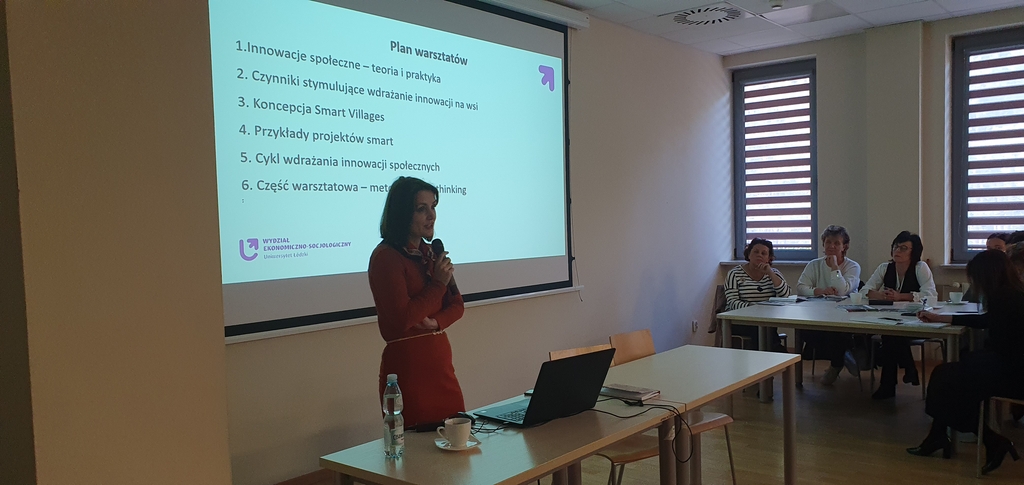
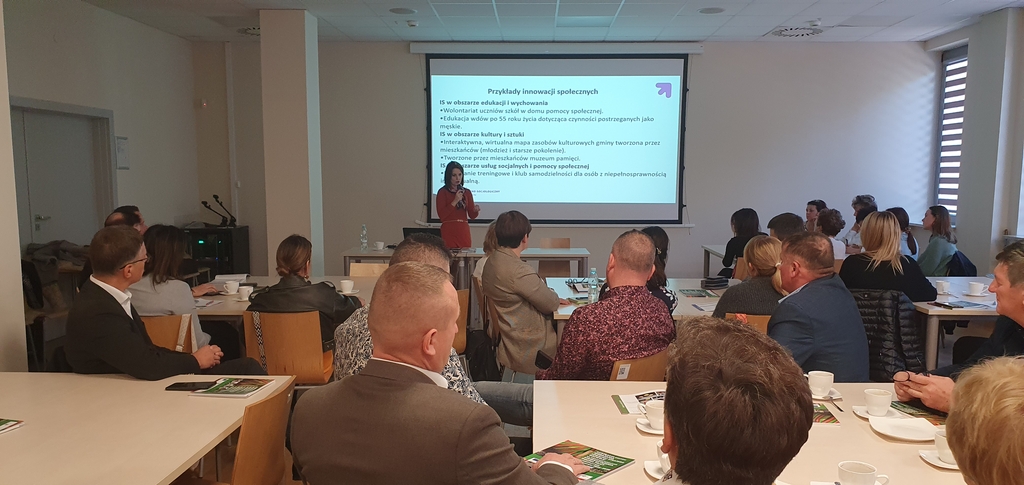
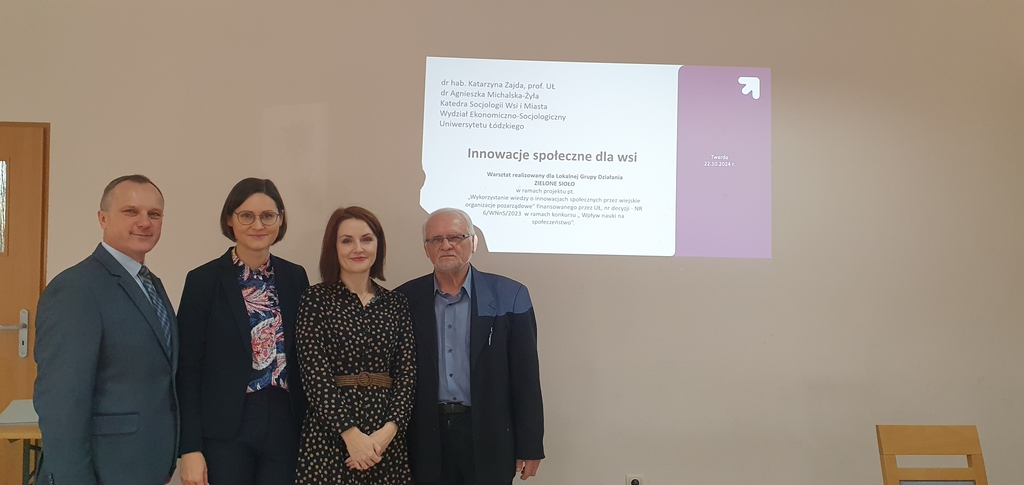
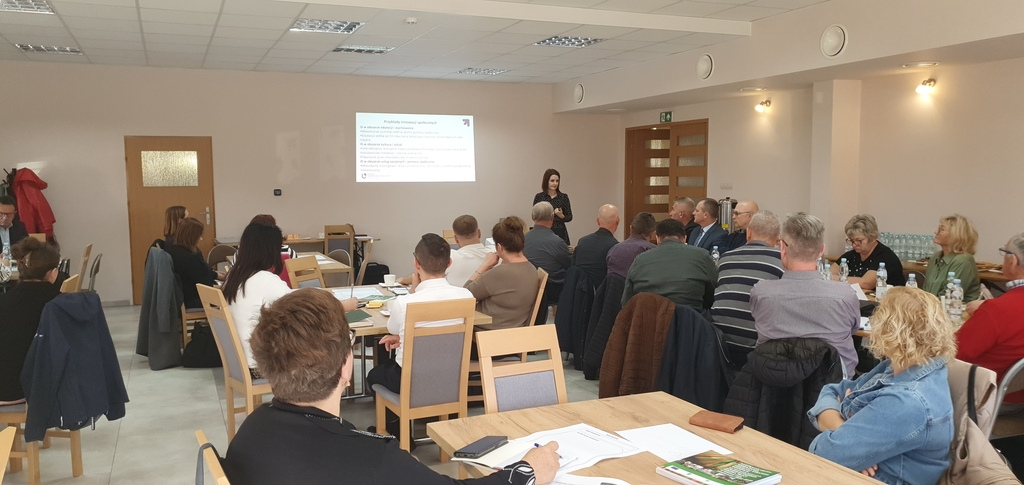
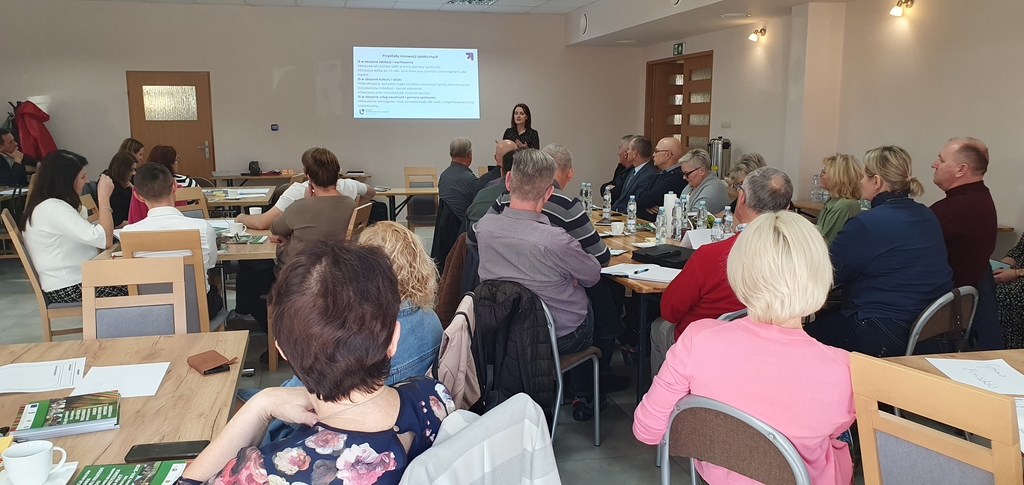
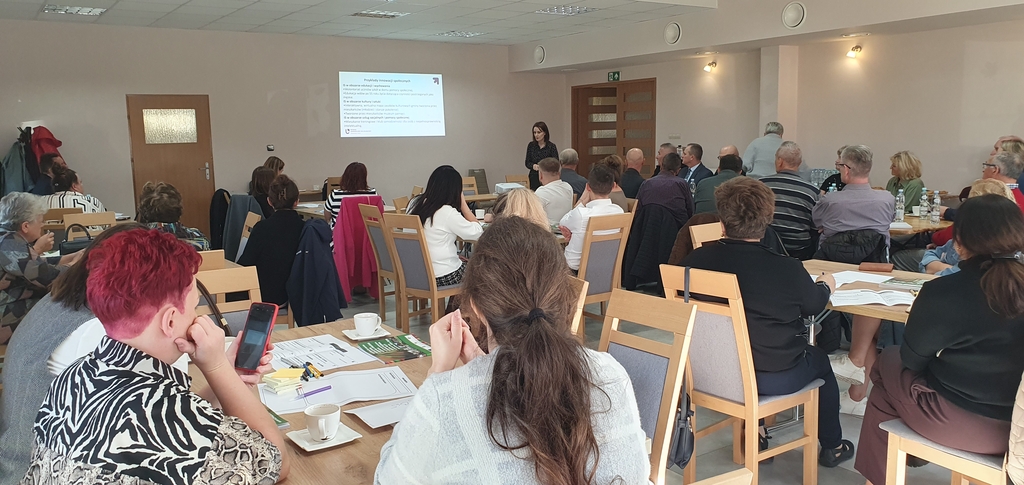
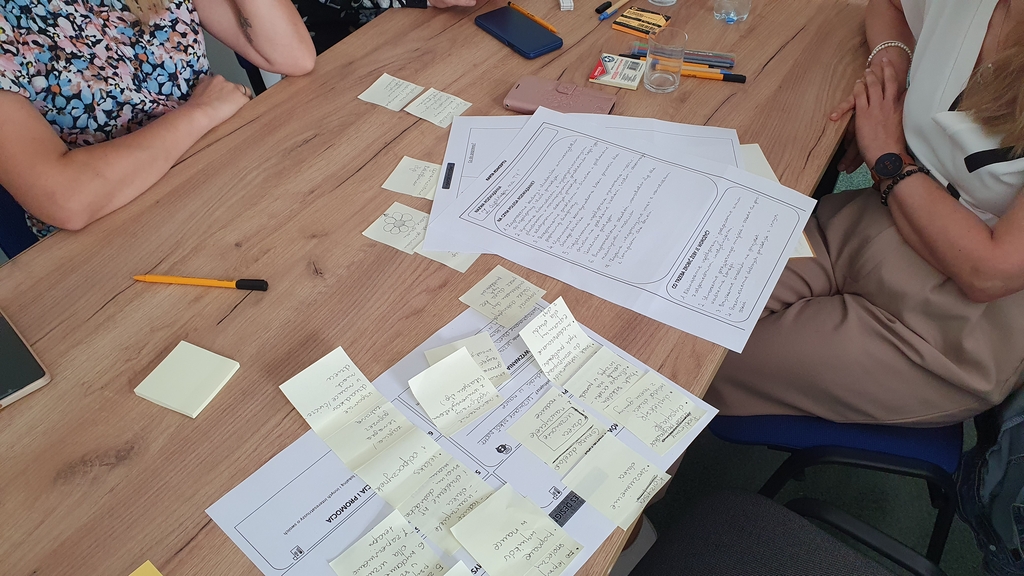
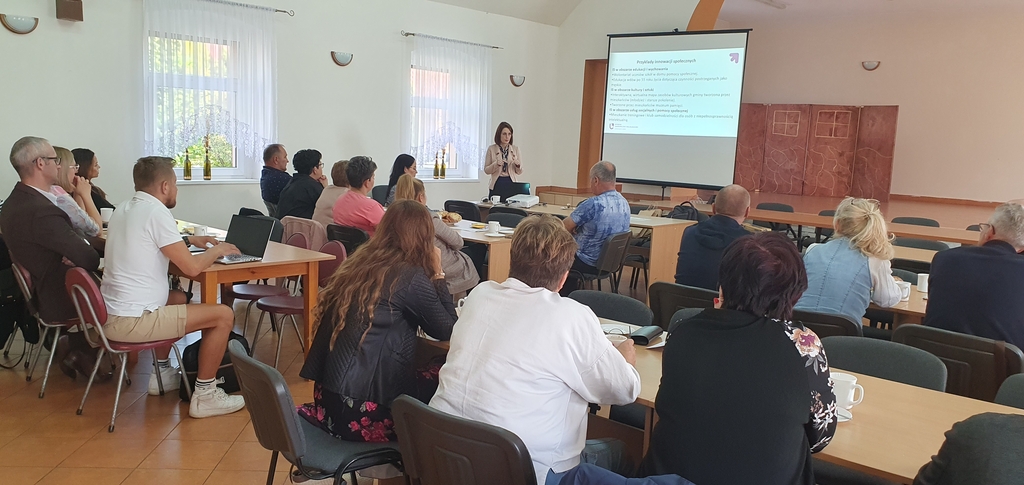
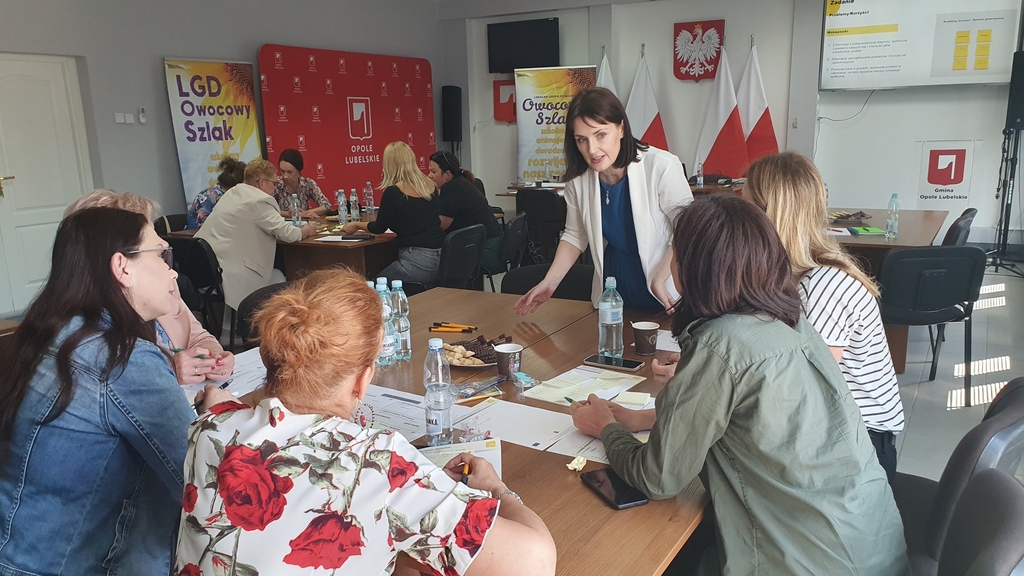
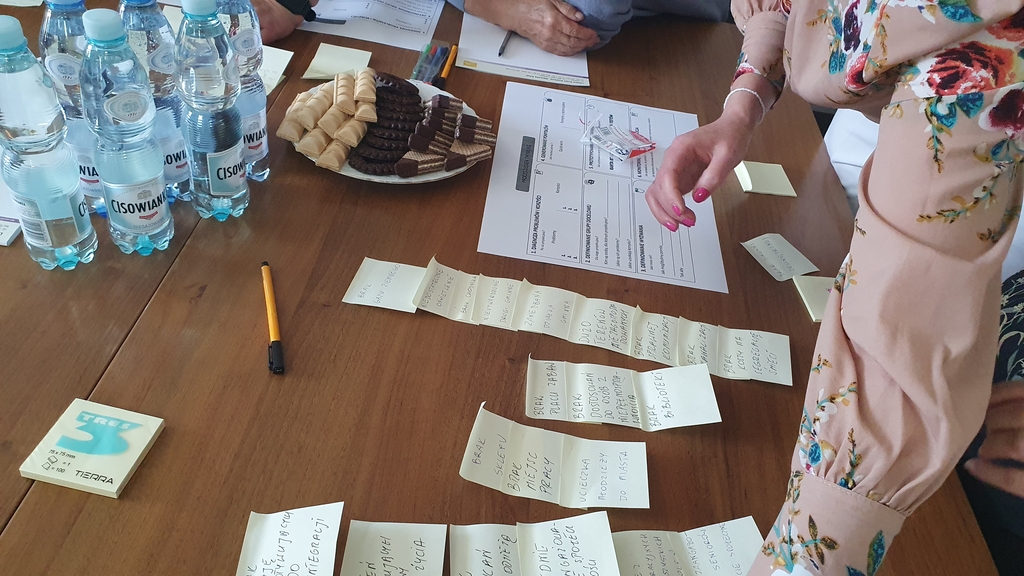
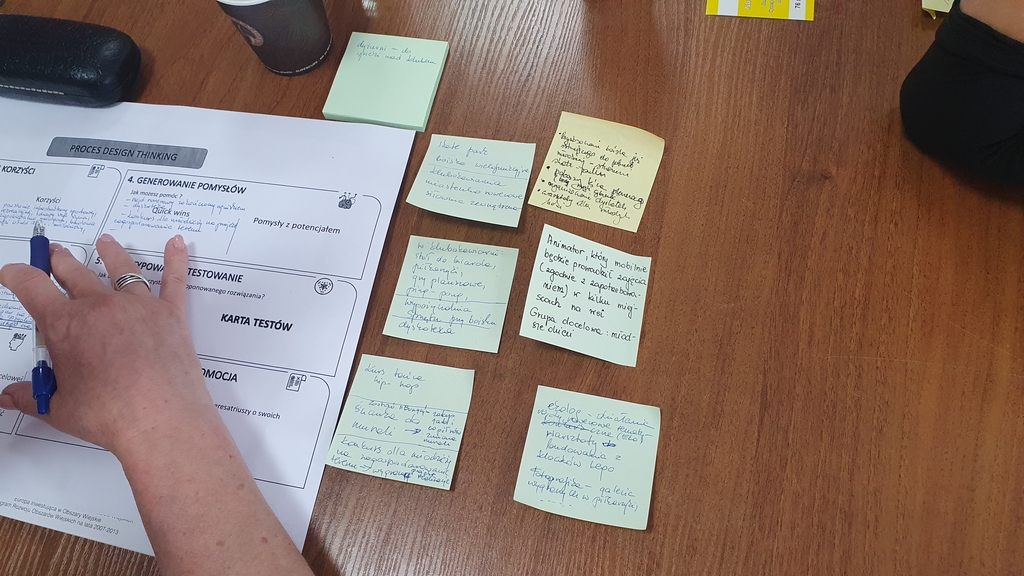
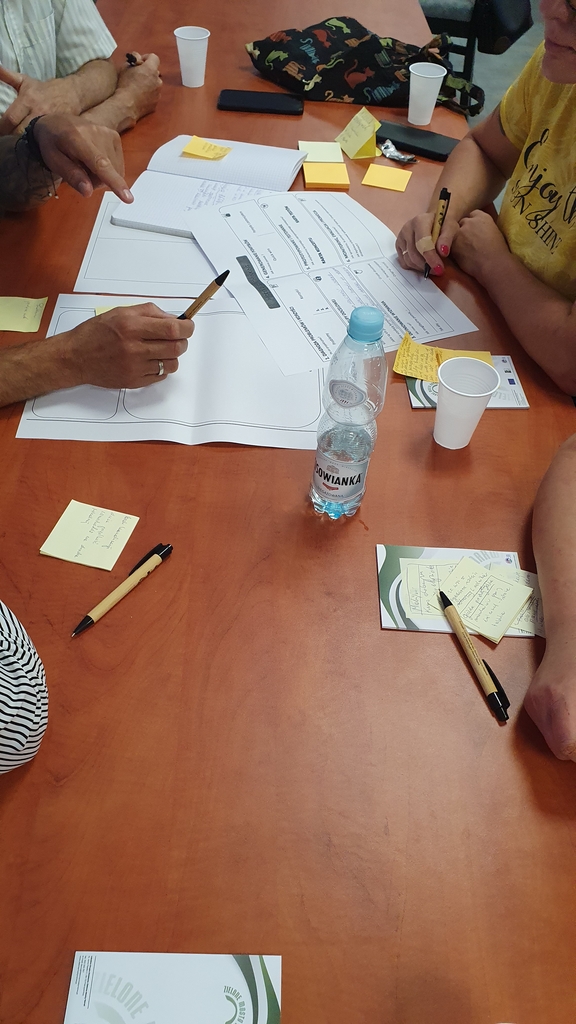
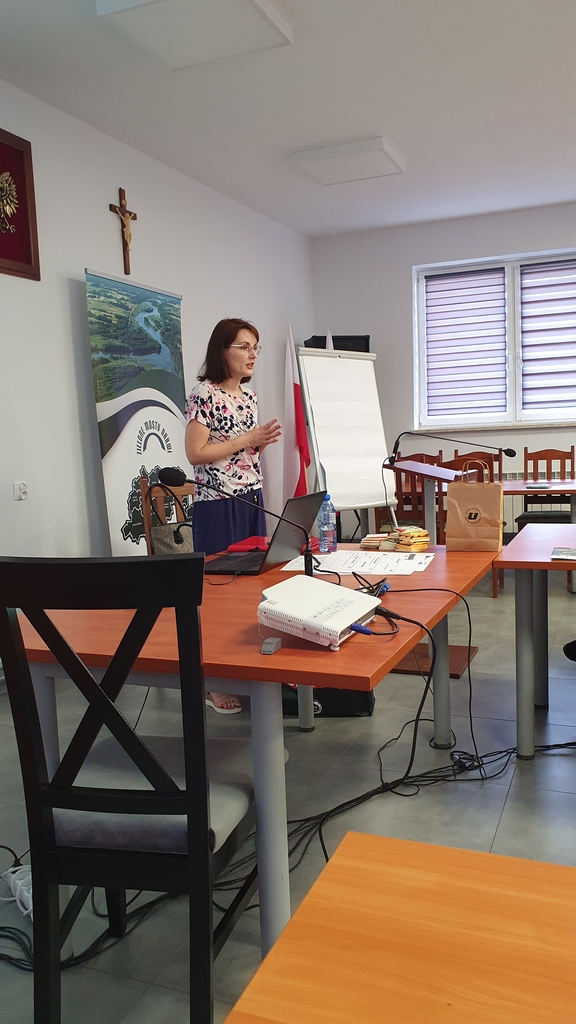
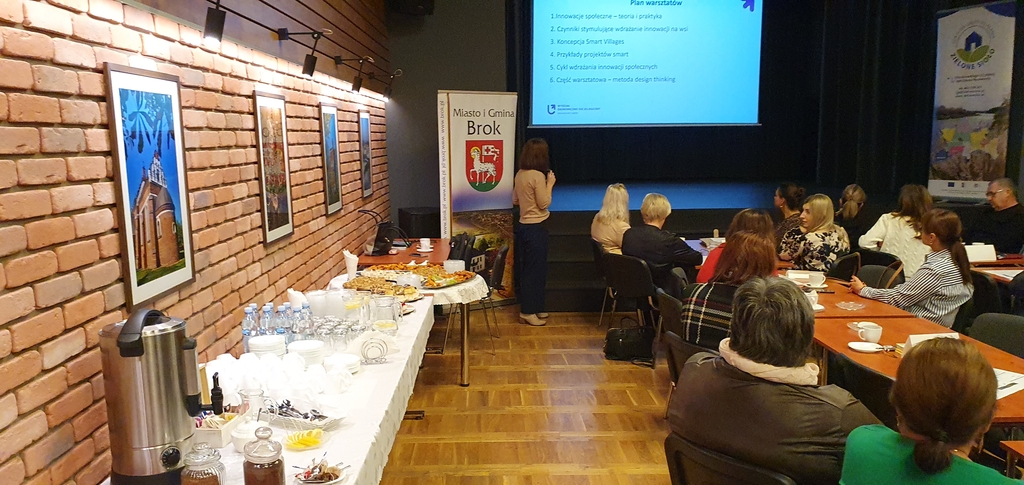
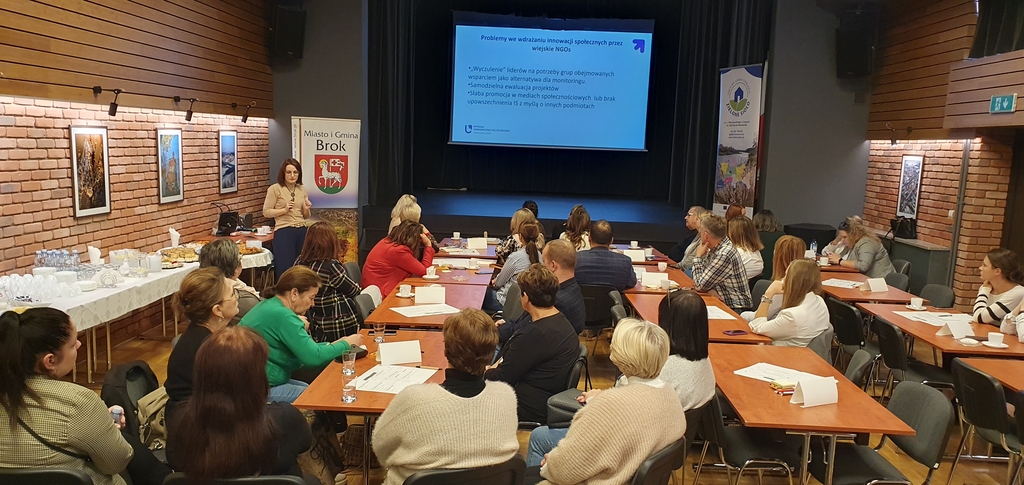
The CIVIC INCUBATOR
Project number: 101146693
Budget: 142,415.00 €
Funding: The project, funded by the Citizens, Equality, Rights and Values (CERV) programme, is in line with the EU’s objectives of increasing democratic participation and active citizenship.
Duration: October 2024 – September 2026 (24 months)
Objective: The CIVIC INCUBATOR (CIVIC_IN) project aims to promote and protect European values by empowering informal civil society groups and active citizens in Europe. By promoting democratic engagement and social inclusion, the project aims to create a support framework for these groups to increase their influence at local and EU level. By promoting cooperation and capacity building, CIVIC_IN envisages a future where informal groups play a key role in shaping a citizen-centred Europe.
The project addresses the challenges faced by informal groups and active citizens in their pursuit of social change. Based on the values set out in the Charter of Fundamental Rights of the European Union, CIVIC_IN promotes freedom, the right to association and the principles of European citizenship. It aims to provide innovative solutions and frameworks to support these groups in their critical work in communities across the EU.
As part of the project:
1. We conduct research to map the challenges and opportunities for informal groups.
2. We organize Ideathons to inspire innovative solutions and support creativity.
3. We facilitate the exchange of experiences between non-governmental organizations and informal groups.
4. We offer an incubation package to strengthen the operational capacity of grassroots initiatives.
5. We initiate debates and propose policy recommendations to amplify the voice of active citizens.
6. We disseminate the project results to ensure the sustainable impact of the entire project at local, national and international levels
For whom?
Main target groups: Informal civil society groups, active citizens and organisations.
Indirect beneficiaries: Communities, local authorities and other stakeholders
We are implementing the project in partnership:
Centre for Social and Economic Investments (Poland) – Project Coordinator
University of Lodz - Center for Social Innovation (Poland) UNILODZ
Alternativ Közösségek Egyesülete (Hungary) ACA
Solidaridad Sin Fronteras (Spain) SSF
Fundatia PACT (Romania) PACT
IASIS (Greece) IASIS
Project details available at: https://civic-in.eu/
Contact:
For more information: kontakt@cise.org.pl
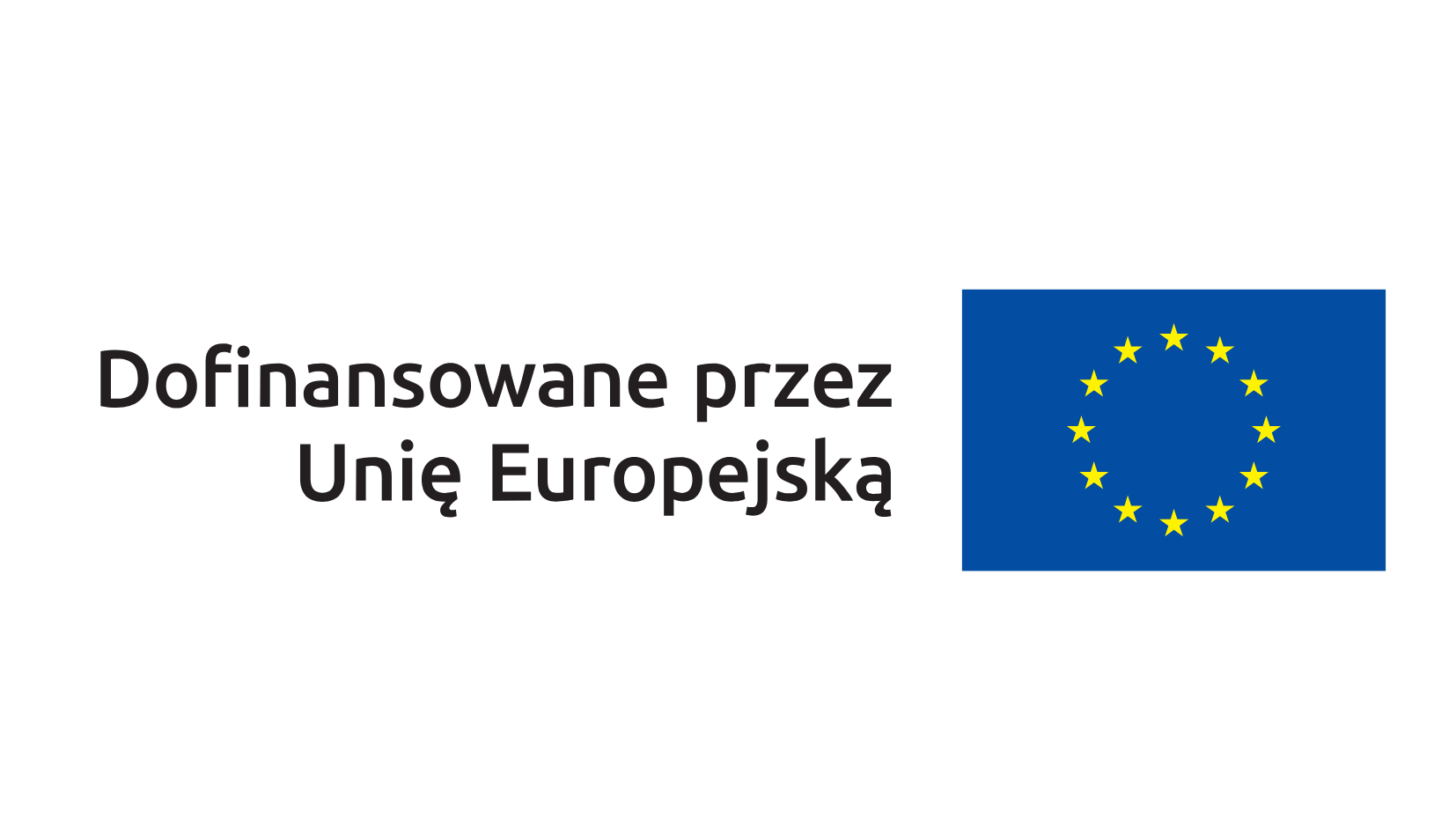
How to join the center?
JOIN US
Anyone interested in active participation in the activities of the University of Lodz Center of Social Innovations can join it – researchers representing various research perspectives, doctoral students, students, representatives of business, non-governmental organisations, local government units, social activists. You just need to report your willingness to join activities of the unit to the Head, Members of the Scientific Council or other Members of the Center or receive an invitation from them.
Membership in the Center is voluntary. Members have the right to express their own opinions and views that do not conform to the principles of social coexistence.
OPTIONAL PRACTICES IN THE CENTER
The University of Lodz Center of Social Innovations connects the world of science with the social, cultural and business environment, including non-governmental organisations. Its aim is to critically and reliably describe social life and difficulties experienced by social groups, as well as to search for and disseminate innovative social solutions that are to respond to social needs; supporting civic participation; implementation of the idea of the university's social responsibility.
We offer non-obligatory internships.
Join us, if:
- you like working in a team
- you are responsible and committed
- you like working with people
- you are creative in perceiving social problems
- you have communication and interpersonal skills
- you are open to cooperation between the university and the external environment
- you want to try different types of social innovation activities in different areas
- you want to develop
How can you act?
You can act by performing selected activities that are in line with your interests and are:
- in the area of work of any of the working teams operating within the Center,
- part of the work of individual members of any team,
- part of the current activities undertaken by the Center,
- part of implemented social projects (in the field of counteracting social exclusion, helping the homeless, social responsibility of the university, integration of governmental and non-governmental organisations, and others).
Highly appreciated:
- interesting ideas for social solutions and readiness to implement them (including skills and/or experience in the field of IT)
- fluent navigation in social media
What will you gain?
- experience in the field of social innovation and in cooperation with public and non-governmental units operating in the field of counteracting social exclusion
- flexible working hours
- work in an interesting and interdisciplinary team
- the opportunity to develop and implement your own ideas in the field of social innovations
- participation in ongoing social projects
- satisfaction with helping another person
- the opportunity to develop your own interests
- certificate of being an apprentice/volunteer
- letter of reference
How to apply:
Please send your CV with the clause on the protection of personal data to the following address: malgorzata.kostrzynska@uni.lodz.pl with a note: "Recruitment – non-obligatory internships".
Clause on the protection of personal data: "I consent to the processing of my personal data included in the job offer for the purposes of the recruitment process in accordance with the Act of 29 August 1997 on the Protection of Personal Data, consolidated text: Journal of Laws of (Dz.U.) 2002, No. 101, item 926 as amended"
Thank you for submitting the application, at the same time we would like to inform you that we will contact only selected people.
RULES OF THE CENTER OF SOCIAL INNOVATIONS
Rules
of the University of Lodz Center of Social Innovations
§1
General provisions
- The Center of Social Innovations (hereinafter referred to as the Center) is an interdisciplinary, inter-faculty organisational unit of the University of Lodz.
- The activities of the Center are initiated by representatives of basic organisational units of the University of Lodz, such as: Faculty of Economics and Sociology, Faculty of Philosophy and History, Faculty of Educational Sciences, Faculty of Management.
- The Center uses the abbreviated form of its name, i.e., CEIN.
- The seat of the Center is located at the University of Lodz.
- The Center operates pursuant to the Regulation No. 22 of the Rector of the University of Lodz of 29 October 2012 on the principles of establishing, functioning and financing of the University of Lodz Science and Research Centres and the statute.
- The activities of the Center are supervised by the Vice-Rector of the University of Lodz for Research.
- The organisational structure of the Center consists of: the Head, Scientific Council of the Center, Ordinary Members and an administrative employee.
- Membership in the Center is voluntary. Each Member has the right to express their own opinions and views that do not violate the principles of social coexistence.
- The period of operation of the Center is indefinite.
§ 2
Goals and tasks of the Center and the forms of their implementation
1. The goals of the Center are:
a. to respond to the demand of both science and economy, which is social innovation, understood as non-standard, innovative solutions, being a response to real social challenges and problems;
b. to connect the world of science with the social, cultural and business environment; to create a space for communication, exchange of experiences, where representatives of non-governmental organisations, local government officials, business representatives meet with scientists and students to establish cooperation in the form of implemented projects;
c. to critically and reliably describe social life and difficulties that affect particular social groups, as well as to search for and disseminate innovative social solutions, which are to respond to social needs - the solution are based on active civic participation (not excluding the groups of interested parties who are affected by the problem);
d. to carry out activities leading to the development and implementation of innovative methods, solutions, tools and items helpful in solving social problems;;
e. to popularise and promote social innovations, to introduce them to the public debate;
f. to support civic participation, understood as involving citizens in decision-making processes, participating in discussions and decisions on matters important to them;
g. to implement the idea of the university's social responsibility;
h. to promote the University of Lodz in the local environment.
2. The main task of the Center is to take up cooperation between researchers representing various disciplines of the humanities and social sciences and representatives of the external environment in the implementation of interdisciplinary scientific and research projects aimed at developing and implementing innovative solutions for social development/or for solving important social problems (social innovations).
3. The tasks of the Center are carried out in four areas:
a. Research:
- conducting research, searching for innovative solutions, implementing them in social reality and evaluating them,
- creating and implementing research projects in cooperation with partners from the state, private and non-governmental sectors,
- implementing interdisciplinary and participatory research, action research, etc.,
- conducting pilot research in the field of social innovations,
- conducting research and development (R&D) works
b. Educatin:
- combining teaching with innovative social solutions,
- implementing internships for students and doctoral students as part of implemented activities,
- expanding alternative forms of employment (employee and student volunteering),
consulting, - organising or co-organising meetings, conferences, seminars, study days, open lectures, workshops, discussion panels,
- expanding the teaching offer of the University of Lodz in the field of combining theory with practice and implementation of action research,
- cooperation between basic organisational units of the University of Lodz involved in the implementation of tasks covered by the activities of the Centre,
- disseminating the research results of the Center in the form of scientific and popularising publications;
c. Economy:
- cooperation between science and business as part of co-implemented projects,
- carrying out analyses and expert opinions based on scientific research,
- working on commercialisation of knowledge and research results,
- providing substantive support during the development and implementation of ideas,
- supporting the implementation of social innovations;
d. Society:
- developing, implementing and evaluating social projects,
- cooperating as part of local social and cultural projects,
- cooperating with non-governmental organisations, local government units, entrepreneurs (including social entrepreneurs),
- supporting the integration of the world of science with the local community,
- supporting social revitalisation processes,
- supporting people who are actively involved in the subject of civic participation.
§ 3
Scientific Council of the Center
1. Members of the Scientific Council of the Center:
a. The Scientific Council consists of up to two representatives of each of the Faculties being members of the Center. The composition of the Scientific Council of the 1st term is composed of representatives of the Faculties initiating its establishment.
b. The composition of the Scientific Council is supplemented with representatives of the organisational unit joining the cooperation with the Center (up to two each time, and also in a situation where, with the end of the term of office, a representative of the Faculty has expressed a desire to leave the composition of the Council).
c. New members of the Scientific Council are appointed for the term of office of the elected bodies of the University of Lodz.
d. Members of the Scientific Council can perform their functions for a period longer than one term.
e. With the end of the term of office, representatives of the Scientific Council may express their willingness to continue or leave the composition of the Council.
f. A candidate for a Member of the Scientific Council of the Center is recommended by another Council Member. A candidate for the Council Member is accepted by the Head of the Center pursuant to the resolution of the Scientific Council.
g. In the case of new Faculties of the University of Lodz joining the Center, representatives of these Faculties may join the Scientific Council.
h. The Scientific Council of the Center shall elect, by a simple majority of votes, the Chairperson who, in the absence of the Center Head, performs their duties.
2. The scope of responsibilities of the Scientific Council:
a. The Scientific Council supervises the activities of the Head of the Center; gives opinions on the annual reports presented by the Head.
b. It provides opinions on projects and activities submitted by all Members of the Center.
c. It exercises substantive supervision over working teams.
d. It cares for the high quality and substantive level of the activities undertaken within the Center.
e. It adopts the internal regulations of the Center, in line with the statute.
f. Members of the Scientific Council are required to be present at the meetings resulting from the Centre's meeting and work schedule for a given year (meetings concerning matters important for the functioning of the Center, i.e., the election of the Head, approval of new Members, reviewing projects) Such meetings require the presence of at least half of the members of the Scientific Council).
§ 4
Head of the Center
1. The Head of the Center is selected from among the members of the Scientific Council of the Center by voting with a simple majority of votes. The Head is not a member of the Scientific Council.
a. The Head is appointed for the term of office of the elected bodies of the University of Lodz.
b. The Head can perform their function for a period longer than one term.
2. The scope of rights and responsibilities of the Head of the Center
a. The Head of the Center along with the Scientific Council establish the work and meeting schedule for a given calendar year, with the possibility of modifying these plans.
b. Together with an administrative employee of the Center, the Head documents the meetings and works as well as other activities of the Center; notifies Members of the Centre's about the meetings and activities, coordinates contacts with the University of Lodz and other organisations; represents the Center.
c. The Head is supervised by the Scientific Council of the Center and presents to the Council an annual report on the Centre's activities in January of the following year, which is also sent to the attention of all Center Members.
d. The Head submits a report approved by the Scientific Council to the relevant Vice-Rector of the University of Lodz (in February).
e. The Head convenes the meetings of the Council and meetings of all Center Members according to the agreed work schedule and, if necessary, also submitted by ordinary Members of the Center or Members of the Scientific Council.
f. The Head makes the final decision regarding the implementation of specific social projects.
g. The Head supervises the working teams.
h. The Head is obliged to be present at the meetings during which decisions important for the Center are made, for which the Head is responsible.
i. The Head represents the Center during meetings with the university authorities and outside the university.
§ 5
Ordinary Members
1. A person interested in active participation in activities of the Center, academics representing various research perspectives and practical experiences, doctoral students, students, representatives of business, non-governmental organisations, local government units, and social activists may become an ordinary member of the Center.
a. A Candidate may apply to the Head and the Scientific Council with a request to be included in the membership of the Center, thanks to the recommendation of the Head, the Scientific Council or another Member of the Center, as well as as a result of an invitation from the Head the Scientific Council and another Member – then they complete a declaration, which is submitted in paper form to the Head or member of the Scientific Council.
b. The Candidate's candidature is subject to voting which the Head, the Scientific Council and other ordinary members participate in. Acceptance is by simple majority vote.
c. Membership in the Center may terminate as a result of:
- resignation,
- failure to comply with the obligations arising from the Center regulations,
- actions to the detriment of and against the assumptions of the Center.
- The person in question loses the status of the Center Member on the basis of a request from the Scientific Council by the Head's decision. In situations where proceedings are pending against a representative of the Scientific Council or the Head, then that representative is excluded from voting.
2. The scope of rights and obligations of ordinary members
a. They can be appointed to the Scientific Council.
b. Ordinary members have the right to:
- participate in projects run by the Center,
- submit opinions, conclusions and postulates to the Scientific Council and the Head of the Center,
- freedom to express their views and opinions;
- submit their own proposals for activities and projects, take the initiative of meetings – if necessary, also outside the agreed
- schedule for a given year of the work of the Center,
- obtain information on the work of the Center,
- receive references regarding their activities within the Center.
c. Ordinary members are obliged to:
- maintain an active attitude towards the assumed project obligations and presence at meetings resulting from the Centre's meeting and work schedule for a given year,
- take care of the good image of the Center,
- comply with the Statute of the Center and the decisions of the Scientific Council and the Head,
- confirm on an annual basis their membership on the terms established by the Council,
- keep the deadlines for the work they undertake.
§ 6
Working teams
1. In order to implement project activities, the Head, the Scientific Council of the Center as well as ordinary members may create separate project working teams, each time represented by team coordinators, elected by a majority of votes of a given team.
a. Working teams deal with the implementation of specific tasks and projects carried out by the Center.
b. Substantive supervision over the activities planned by the working teams is exercised by the Head of the Center and Scientific Council.
c. Team coordinators submit reports on their activities to the Head at the end of the calendar year, according to the template adopted by the Scientific Council of the Center.
d. Working teams determine the work schedule independently, including the schedule of meetings.
e. Persons who are not members of the Center may cooperate as part of the teams.
§ 7
Administrative employee
1. The scope of responsibilities of the administrative employee of the Center:
a. They identify the possibilities of obtaining funds from various sources for the implementation of the projects of the Center and help in the preparation of projects and their submission; they deal with the administration of projects.
b. They document the meetings and works, and other activities of the Center together with the Head of the Center.
c. They are in charge of the Center's correspondence.
d. They take care of the website and social media informing about activities of the Centre and other forms of promoting the Center's activities.
e. An administrative employee is obliged to be present at the meetings of the Center resulting from the schedule of meetings and work of the Center adopted for a given year.
§8
Funding rules
1.The activity of the Center of Social Innovations of the University of Lodz is financed from national and foreign grants, European funds, funds obtained from other external sources and from statutory funds at the disposal of the Heads of organisational units making up the Center and units participating in the work of the Center.
2. The Center applies for the appointment of a full-time job for an administrative employee, which would be financed by the Rector of the University of Lodz for a period of one year.
CONTACT US
Center of Social Innovations
University of Lodz
The Biedermann’s Palace
ul. Franciszkańska 1/5, room 15
91-431 Lodz
e-mail: cein@uni.lodz.pl
contact with the media: agata.rudnicka@uni.lodz.pl
![[Translate to English:] grupa osób siedzących wokół stołu](/fileadmin/Jednostki/CEIN/warsztaty-innowacje-spoleczne-na-wsi.jpeg)
![[Translate to English:] Grupa usmiechniętych osób pozująca razem do zdjęcia.](/fileadmin/Jednostki/CEIN/attachment1751490383820.jpg)
![[Translate to English:] 1](/fileadmin/Jednostki/CEIN/1000000431.jpg)
![[Translate to English:] 1](/fileadmin/Jednostki/CEIN/500814322_708210781744331_833466686708400597_n.jpg)
![[Translate to English:] 1](/fileadmin/user_upload/aktualno%C5%9Bci/UTF-81000000161-1.jpg)
![[Translate to English:] 1](/fileadmin/user_upload/aktualno%C5%9Bci/konkursy_46f999626be9f16f0bd4cabc5eecc7b7_main.png)
![[Translate to English:] 1](/fileadmin/user_upload/aktualno%C5%9Bci/UTF-8%C5%BCycz%C4%85_cz%C5%82onkowie_CEIN.png)
![[Translate to English:] 1](/fileadmin/Jednostki/CEIN/projekty_3dd1e5750d5555ea5f4cbacf7c6ac80e_view.png)
![[Translate to English:] 5](/fileadmin/user_upload/aktualno%C5%9Bci/5.webp)
![[Translate to English:] kompetencje](/fileadmin/Jednostki/CEIN/standard-quality-control-collage-concept.jpg)
